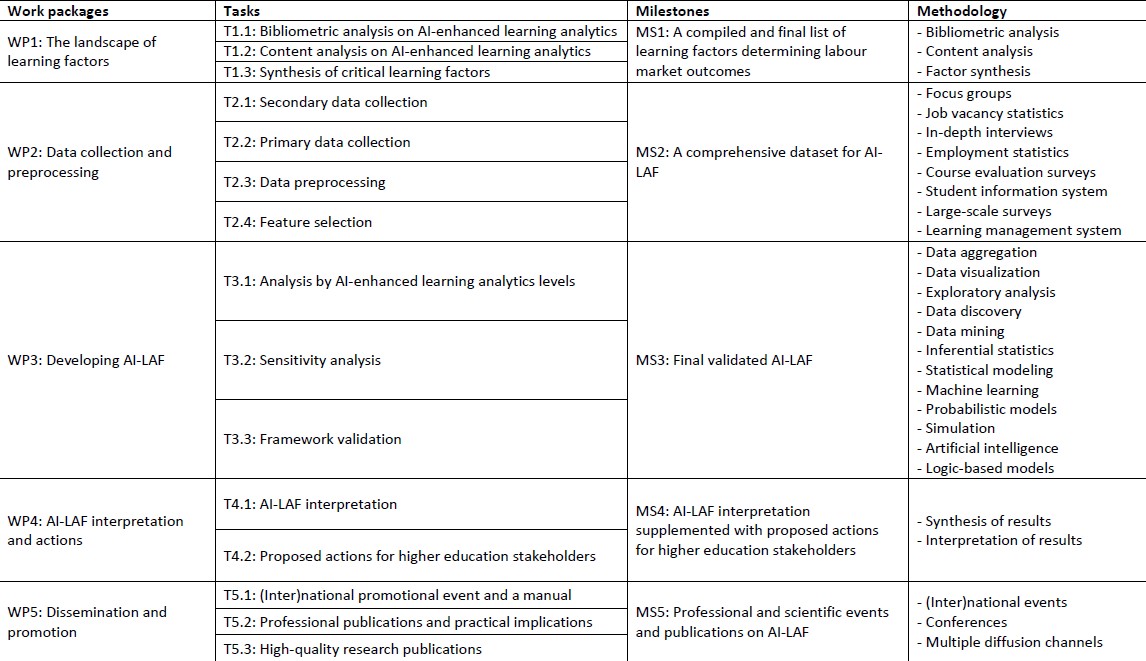Title: Artificial intelligence-enhanced learning analytics framework for a blended learning environment in higher education for measuring labour market outcomes (J5-60095)
Head of the research team: doc. dr. Damijana Keržič
Significant changes in the global economy, resulting from numerous socioeconomic challenges, require a rapid response from higher education to keep up with labour market dynamics. It is expected that the increasing pace of automation and digitalisation, coupled with a recession caused by various factors such as the Covid-19 pandemic and the Russo-Ukrainian War, will create a ‘double disruption’ scenario on the supply side of the labour market. Additionally, higher education systems, particularly in Central and Eastern Europe, are less effective and insufficiently aligned with labour market expectations and trends. It is also true that students graduating during economic crises typically face greater employment challenges than those graduating during growth periods. Recently, artificial intelligence has also had a significant impact on changing knowledge and skill demands in the labour market as the requirements for skills and knowledge desired in various industries evolve. While artificial intelligence may represent an additional disruption in the currently unpredictable socioeconomic environment, it has also attracted considerable attention in higher education, where its application offers great potential for improving learning analytics and consequently enhancing teaching and learning processes. There is an evident lack of comprehensive data analytics frameworks for measuring education outcomes in the labour market in Central and Eastern Europe that consider the context of a combined learning environment and unpredictable labour market dynamics. Accordingly, there is a need for the higher education system to address these challenges and leverage the potential of integrating artificial intelligence into learning analytics for planning future labour market needs.
The mission of the project is to improve the higher education system to be resilient to current trends in blended learning and labour market demands. The goal is to use artificial intelligence for an improved framework of learning analytics in a blended learning environment in higher education, combining various data sources and including different dimensions of learning analytics. As it will also focus on the labour market, it will enhance and expand existing frameworks of learning analytics. Measuring labour market outcomes (student satisfaction, performance, and employability) will take into account attributes and critical factors related to the study process (characteristics and feedback) and labour market factors (trends and expectations). The proposed framework for higher education learning analytics will cover different levels (descriptive, diagnostic, predictive, and prescriptive) of learning analytics and their respective goals (monitoring, assessment, forecasting, recommending) and methods (various statistical approaches), and will be developed according to the specifics of the narrower blended learning environment and broader frameworks of higher education and the labour market.
Artificial intelligence-enhanced learning analytics framework will be based on several quantitative and qualitative literature review techniques (e.g., bibliometric analysis, content analysis, factor synthesis), data collection approaches (e.g., learning management system, course evaluation surveys, employment statistics, focus groups) and data analysis methods (e.g., exploratory analysis, data mining, machine learning, simulation). Intensive use of the proposed artificial intelligence-enhanced learning analytics framework will enable higher education and the labour market stakeholders to make better informed and more reliable decisions. The unpredictable nature of the labour market will be addressed by the holistic approach, facilitating the hitherto still not achieved systemic way of harnessing the learning analytics, thus laying important foundations for the further modernization of higher education to adequately adapt to future challenges of the labour market.
Duration (from/to):
1.1.2025 – 31.1.2028
Contracting Authority:
Slovenian Research and Innovation Agency
Financing:
The project is being financed with 2493 yearly hours of A price category; for 3 years.

Project phases and their realization
The work programme consists of five work packages, which will assist in thoroughly checking the work on the research project. A summary of the work programme is presented in Table bellow.

